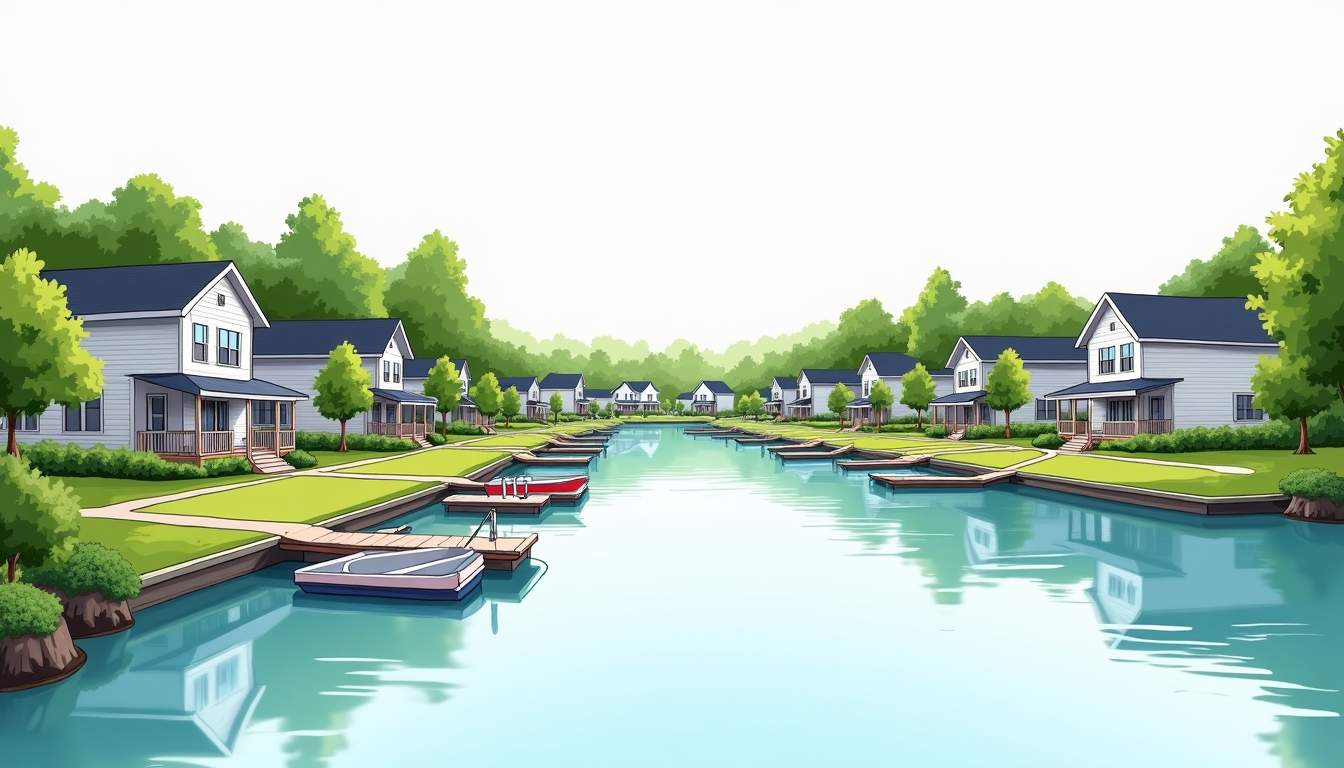
Buying a home in a waterfront event community blends the pleasures of living near water with the convenience and vibrancy of organized community life. These neighborhoods often host concerts, festivals, regattas, farmers markets and seasonal celebrations right on the shoreline or in adjacent parks. For buyers, the appeal is obvious: spectacular views, direct access to recreational activities, and a social lifestyle. At the same time, there are practical considerations that can make a big difference in long-term satisfaction and resale value. This guide walks through the most important factors to evaluate before making an offer.
A waterfront event community is typically a residential development or neighborhood located on or near a body of water—ocean, lake, river, or large bay—that has a calendar of organized public or private events. These events may be run by homeowner associations, municipal authorities, or private event companies, and they can range from small weekly markets to large-scale festivals attracting thousands.
Common features include promenade walkways, amphitheaters, piers, marinas, and mixed-use zones with shops and restaurants. Infrastructure is often designed to support both daily recreation and periodic gatherings, which means public spaces and transportation access are usually prioritized in planning.
Quality of life often improves with direct access to water and a lively events schedule. Waterfront views and breeze can create a calming environment, while community programming provides constant opportunities for social interaction without needing to travel far.
Property values in desirable waterfront locations tend to be resilient, and event-driven foot traffic can support local businesses, which adds convenience. For those who enjoy an active lifestyle, kayaking, boating, cycling and waterfront dining become part of the routine rather than occasional treats.
Regular events offer an easy way to meet neighbors and build a sense of community. Whether attending a summer concert series or joining a community clean-up, social engagement is more accessible. This matters for families, empty-nesters, and young professionals alike.
Well-managed waterfront communities with a steady event calendar can enhance long-term demand and stabilize resale prices. Local businesses benefit from event visitors, which supports the neighborhood's amenities and services—important for both renters and owners.
No community is perfect, and waterfront event neighborhoods come with trade-offs. Events bring noise, traffic, and occasional crowds, and living near water introduces environmental risks such as flooding, erosion, and salt corrosion. Weighing these factors against the lifestyle benefits is crucial.

Event schedules often concentrate activity into weekends and evenings, which can mean late-night noise and extra pedestrian or vehicle traffic. Consider proximity to event staging areas and whether the home has sound-insulating features. Privacy can be limited if open promenades run close to residences.
Being close to water increases exposure to salt air and moisture, accelerating wear on building materials. Flood risk and insurance costs may be higher, especially in low-lying areas. Investigate local flood maps, community resiliency measures, and the HOA's maintenance programs for seawalls, drainage, and landscaping.
When touring homes, combine aesthetic impressions with practical checks. Look for signs of water damage, the quality of exterior materials, and any fatigue on balconies, docks or wooden decks. Ask for recent inspection reports and review any maintenance records available through the seller or HOA.
Consider a home’s orientation and elevation: higher floors or properties on raised foundations generally fare better in storms and floods. Also evaluate access routes—how close is the property to the main event areas, parking, and public transit? The ideal location depends on how much proximity to events is desired versus a quieter setting.
Key questions to cover include: What is the typical event calendar and frequency? Are events managed by the HOA or the municipality? How are noise and crowd control handled? What are the historical utility and insurance costs related to waterfront living? When were major exterior components (roof, siding, seawall, dock) last replaced?
Hire a home inspector experienced with waterfront properties to look for mildew, rot, rust on metal fixtures, and compromised seals around windows and doors. Inspect crawlspaces and basements for past flooding, and review any lift station or sump pump maintenance. A structural engineer consultation is recommended if the property shows signs of foundation shifting or significant water exposure.
The homeowner association or municipal body usually sets the expectations for events and enforcement. Review HOA covenants, conditions and restrictions (CC&Rs), bylaws, and financial statements. Understand what percentage of assessment income is allocated to event programming, waterfront maintenance, and reserve funds for large repairs.
Some communities have resident advisory boards or public meetings to shape event programming. Investigate the level of resident input and how complaints are handled. A community with transparent processes and regular communication typically strikes a healthier balance between events and residential life.
Living in a waterfront event community can mean higher HOA fees or special assessments for infrastructure upkeep and event staffing. Find out whether the HOA has recently levied special assessments and whether reserve funds are sufficient for foreseeable repairs like seawall replacement or dock refurbishment.
Insurance is one of the most important financial considerations. Flood insurance may be required or strongly recommended, and premiums can vary widely depending on flood zone designation, elevation, and mitigation measures in place. Work with an insurance agent familiar with the area to estimate annual costs and understand coverage limits.
Flood maps from local planning departments or FEMA are the starting point for risk assessment. Properties in high-risk flood zones typically need flood insurance, and lenders will often require it. However, even properties outside the highest risk areas can flood during major weather events, so consider options for additional coverage or catastrophe riders.
Look for community investments in mitigation: seawalls, elevated boardwalks, managed wetlands, stormwater systems, and emergency response plans. Individual homes may have elevated utilities, flood vents, and resilient building materials. These measures can lower insurance premiums and limit long-term damage.
Waterfront event communities include single-family homes, townhomes, condominiums, and live-work units. Each has different implications for maintenance, privacy, insurance, and access to shared amenities. Condos may offer more event-oriented services and lower individual maintenance responsibility, while single-family homes provide more privacy and control over exterior modifications.

Upper-level units often command a premium because of unobstructed views and reduced flood risk, but ground-level living offers easier access to docks and outdoor spaces. Consider whether outdoor living space is a priority and how often events might intrude on that space. Balconies and terraces should be inspected for sound barriers and privacy screens if noise is a concern.
Pay attention to parking availability during event days, elevator reliability for taller buildings, and proximity to essential services like grocery stores, medical care, and transit. Some communities offer resident-only parking, which can help on heavy event days, while others rely on public lots and street parking, which may be competitive.
When making an offer, leverage objective research: recent comparable sales, seasonal occupancy trends, and any deferred maintenance or upcoming assessments that may impact value. Include contingencies for inspections focused on water-related issues and clarify responsibilities for docks or boat slips if they are included.
Timing matters. Touring the neighborhood during major events provides first-hand knowledge of noise levels and crowd behavior; conversely, visiting during low season shows everyday conditions. Consider whether a property’s appeal is driven by seasonal peaks that could affect occupancy and rental income if planning to rent.
Think beyond the immediate lifestyle benefit and evaluate long-term trends. Climate change, local development plans, and shifts in event programming can materially affect property desirability. Communities that invest in resilient infrastructure and maintain a balanced event calendar tend to retain value better over time.
Research upcoming zoning changes or development proposals that could alter traffic, view corridors, or noise patterns. New commercial development can boost convenience and demand but may also increase event scale and intensity. Local planning boards provide public records and meeting minutes that illuminate future plans.
Resale potential depends on marketability to both lifestyle buyers and investors. Homes with flexible layouts, durable materials, and low maintenance requirements are easier to market. Properties with restrictive covenants or high ongoing fees may have a narrower buyer pool, so price accordingly.
Before finalizing a purchase, confirm flood elevation certificates, recent inspection reports, HOA minutes and financials, event schedules and policy documents, and insurance quotes. Arrange for a final walk-through during an event to observe noise and access conditions, and verify that any agreed repairs have been completed.

With careful due diligence and realistic expectations, buying in a waterfront event community can deliver a vibrant lifestyle and strong long-term value. The key is to weigh the trade-offs, gather detailed information about events and infrastructure, and choose a property that matches both lifestyle desires and practical needs.
Ready to experience the vibrant lifestyle of a premier waterfront event community? At Tennessee National, enjoy luxury living with access to a Greg Norman Signature Golf Course, private marina, waterfront dining, and over 20 exclusive amenities—all set against the stunning backdrop of Tennessee’s natural beauty. Whether you’re seeking a move-in ready home or a custom build, our gated community offers the perfect blend of relaxation and social engagement. Schedule your private tour today and start making memories every day at Tennessee National.